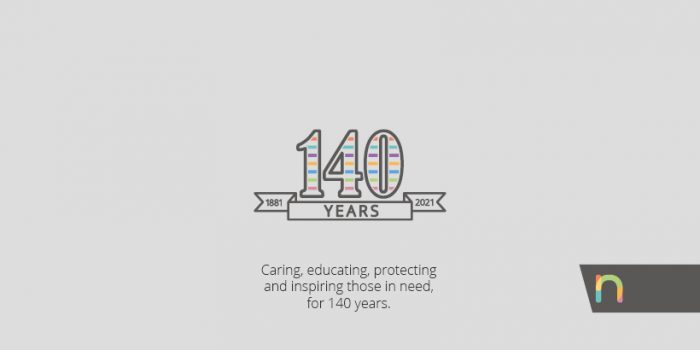Brokering a sustainable and beneficiary-focused future for children’s residential care in the UK
This year marks our 140th anniversary; 140 years of care, support and education for children, adults and families facing hardship and adversity across the region.
Since our prophetic beginnings in Victorian Liverpool under the leadership of Father James Nugent, Nugent has grown to become an indispensable, yet relatively unrecognised, social care and welfare asset from the Liverpool City Region.
Our services span from an adoption service, children’s care homes and a special independent school to a number of adult care homes and supported independent living services. We also support a plethora of community-focused activities. Our overriding focus has been, and always will be, protecting, educating, caring and inspiring for the best interests of children and young people in need.
Reflecting on our 140th year, which arrives at the tail end of the COVID-19 pandemic and a time of great upheaval, our inimitable CEO Normandie Wragg, shares her thoughts on the state of children’s social care in the UK and her hopes for the future.
Normandie Wragg:
The COVID-19 pandemic has drawn attention to the value and importance of our social care sector and it is encouraging to observe a renewed level of public recognition, appreciation and respect for social care professionals alongside their NHS counterparts.
At Nugent, we love our beneficiaries fiercely and we remain united by a common culture of integrity, ambition, courage, compassion, optimism, respect and dignity. It is these values in combination with our dedication to the children, young people, adults and families we serve that holds us together in the face of adversity.
At a time of much uncertainty, unease and upset, our staff and volunteers have kept our doors open and continued to deliver essential services to those most in need of our support.
The coronavirus pandemic has tested Nugent like no other crisis before it. As an organisation, we have had to make challenging decisions and many changes to the way we work. It has not been easy.
The pandemic has shone a bright light on the shortcomings and fragilities of our social care system and underlined the woeful lack of sustained investment in social care provision over the course of the last decade with charities often making up the difference of the true cost of care.
There is clearly momentous challenges within the sector to overcome – with thousands of vulnerable young people still in unregulated accommodation up and down the country.
We also still see a worrying shortage of places nationally and a dearth of adequate placements for children who would benefit from staying closer to ‘home’. This situation has forced some looked-after children to take up placements hundreds of miles from where they are from – whilst there are occasions, where distance is an informed decision, this is not always the case.
If we are to recover from this crisis, we must also address longstanding failings within the social care system; 2021 must be the year we change gear and take action.
Back in January, I enthusiastically welcomed Gavin Williamson’s launch of and commitment to a wholesale independent review of children’s social care – with the underlined ambition to “radically reform the system” and thus “improve the lives of England’s most vulnerable children so they experience the benefits of a stable, loving home”.
I was particularly encouraged by the ‘call for advice’ that the Chair of the Review, Josh MacAlister, issued to help shape the early work of the review. This is something I fully intend to pursue.
Ours is a complex sector, characterised by a cacophony of local authority operated establishments as well as a large number of privately-owned children’s homes. There are also a handful of charitable organisations operating within the sector, such as Nugent. As with any health and social care economies – there are outstanding providers and there are providers that need improvement or more.
Josh MacAlister recently described the children’s social care market as ‘broken’ and Dame Rachel de Souza has described the availability and appropriateness of therapy for looked-after young people as ‘patchy’ at best. It is agreed that responsibility for making the provision of children’s residential care ‘work’ has fallen through the gaps – perhaps due to government inaction – and that we must pull together to ensure that instability that children in care experience is minimized/eliminated.
I ardently believe that Nugent, and charitable organisations of a similar ilk, could (and should!) be considered as focal points for collaborative action.
As one of the very few not-for-profit care providers in the UK, Nugent has no shareholders. This means that we are dedicated to reinvesting any surplus that we receive back into the services we provide. Additionally, any charitable income we do receive helps us to fund life-changing and life-enhancing activities and services for those in our care.
We have a unique operating model and a distinct perspective. While not a panacea for all the challenges facing children’s social care provision, charities have an important role to play. Most charities benefit from buoyant levels of public trust, goodwill and cooperation. All charities have the potential to build bridges and unite stakeholders through their work. Charities can prove instrumental in the development of novel and collaborative solutions to pressing societal challenges.
Our hope at Nugent is to help change mindsets and shape new models where the private and public sectors can maximize each other’s expertise, reach, and resources, without compromising on what is important.
I am aware that in recent days, Josh MacAlister has published some strong words in relation to mounting pressures within the children’s social care system and his belief that economic realities make the profits made by some independent children’s care home providers ‘indefensible’.
Whilst I emphatically agree that regular scrutiny of the fees and profit made by private sector children’s home providers is sensible and indeed necessary, I believe it is unhelpful to typify such providers as profiteers.
Differences in the quality of care – as measured by Ofsted ratings – between local authorities and large private providers are generally small. Many private-sector providers are at the forefront of providing exceptional care and ‘outstanding’ outcomes for looked-after children.
Importantly, as part of ongoing research, the Children’s Commissioner’s Office spoke to children in care and care leavers about their experiences of the care they received from providers. Most were not concerned by who owned their care home, but they did care deeply about the care they receive and the people who give it.
I emphatically believe that it is only together that we can fix what is broken and guarantee the best possible outcomes for our young people. We will face serious setbacks if we continue to create panic about pounds spent and respond to the challenges we face in an uncoordinated, competing, and fragmented way.
This is why I have recently opted to join the board of the Independent Children’s Homes Association. I see collaboration and the establishment of strategic corporate-charity partnerships as a route to renewed sector innovation, the proliferation of best practice and the development of much needed applied research activity.
I believe that the commercial success of private sector providers ought to be underpinned by standardised environmental, social and governance measures, including responsibility to sustainable philanthropic investment in charitable endeavour operating within the same arena.
In the forthcoming weeks and months ahead, I will be calling upon ICHA colleagues and sector allies to join me in collaborating for the benefit of all children.


